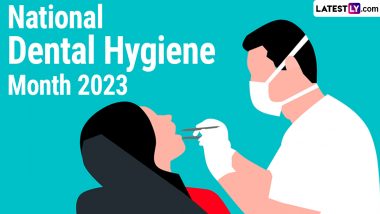Every October, we celebrate National Dental Hygiene Month as a reminder of the critical role oral health plays in our overall well-being. Maintaining good dental hygiene not only keeps your smile bright but also contributes to your overall health. In this article, we'll explore why dental hygiene is so important and provide some practical tips to help you maintain it at home. Five Easy Ways To Maintain Oral Health and Hygiene.
The Importance of Dental Hygiene
- Preventing Tooth Decay: Dental hygiene is the primary defense against tooth decay. Regular brushing and flossing remove plaque, a sticky film of bacteria that forms on teeth and can lead to cavities.
- Gum Disease Prevention: Poor dental hygiene is a leading cause of gum disease, which can range from mild gingivitis to severe periodontitis. Gum disease not only affects your oral health but has been linked to systemic conditions like heart disease and diabetes.
- Fresh Breath: Good dental hygiene helps keep your breath fresh by removing food particles and bacteria that can cause bad breath.
- Preserving Teeth: By preventing cavities and gum disease, you're also preserving your natural teeth. This means fewer dental procedures and a better quality of life as you age.
- Overall Health: Emerging research suggests a connection between oral health and overall health. Conditions like diabetes, respiratory infections, and even pregnancy complications can be influenced by the state of your oral hygiene. 5 Oral Health Symptoms You Should NEVER Ignore.
Tips to Maintain Dental Hygiene at Home
- Brush Regularly: The cornerstone of dental hygiene is regular brushing. Brush your teeth at least twice a day, using fluoride toothpaste and a soft-bristle brush. Pay attention to brushing for a full two minutes to ensure you clean all surfaces.
- Floss Daily: Flossing is just as important as brushing. It removes food particles and plaque from between your teeth and along the gumline. If traditional floss is challenging, consider using floss picks or a water flosser.
- Choose the Right Toothbrush: Use a toothbrush with soft bristles to avoid damaging your gums and enamel. Replace your toothbrush every three to four months or sooner if the bristles appear frayed.
- Rinse with Mouthwash: Consider using an antimicrobial or fluoride mouthwash to kill bacteria, strengthen enamel, and freshen your breath. Consult your dentist for recommendations tailored to your needs.
- Limit Sugary and Acidic Foods: Sugary and acidic foods and beverages can contribute to tooth decay. Limit your consumption of these items, and when you do indulge, rinse your mouth with water afterward.
- Stay Hydrated: Drinking water throughout the day helps flush away food particles and bacteria, reducing the risk of cavities.
- Chew Sugarless Gum: Chewing sugarless gum after meals can stimulate saliva production, which helps neutralize acids and strengthen tooth enamel.
- Regular Dental Checkups: Even with diligent at-home care, it's crucial to visit your dentist regularly for checkups and professional cleanings. Your dentist can detect and address issues early, preventing more extensive dental problems. October 2023 Holidays Calendar With Major Festivals and Events.
National Dental Hygiene Month serves as a reminder that oral health is an integral part of overall health and well-being. By following these tips and maintaining a consistent dental hygiene routine, you can keep your smile bright and your mouth healthy for years to come. So, this October and beyond, make dental hygiene a priority for a happier, healthier you.
(The above story first appeared on LatestLY on Sep 30, 2023 08:57 PM IST. For more news and updates on politics, world, sports, entertainment and lifestyle, log on to our website latestly.com).













 Quickly
Quickly




















